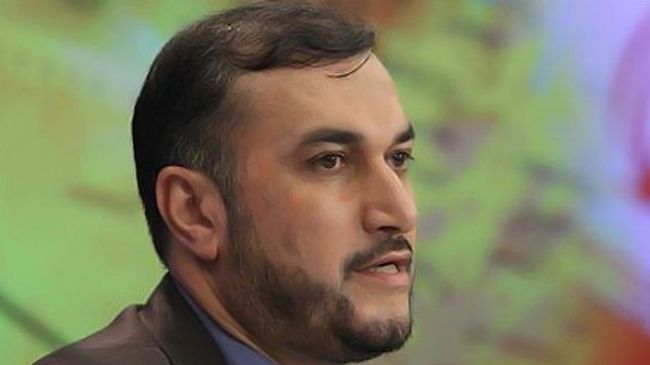[caption id="attachment_133959" align="alignright" width="193"] Iranian Deputy Foreign Minister for Arab and African Affairs Hossein Amir-Abdollahian[/caption]
Iranian Deputy Foreign Minister for Arab and African Affairs Hossein Amir-Abdollahian[/caption]
A senior Iranian diplomat has stressed the importance of adopting a realistic approach to the developments in Syria, saying the United Nations should play an actual role in settling the conflict in the war-torn country.
“The Islamic Republic of Iran wants to see the United Nations [playing its] real role between the sides for and against [the Syrian government],” Iran’s Deputy Foreign Minister for Arab and African Affairs Hossein Amir-Abdollahian said in a meeting with Deputy UN Special Envoy to Syria Ramzy Ezzeldin Ramzy in Tehran on Friday.
The Iranian diplomat hailed efforts made by UN Special Envoy to Syria Staffan de Mistura to settle the conflict in the country and expressed Iran’s willingness to help advance a UN proposal for the suspension of fighting in the northern city of Aleppo.
On October 30, the UN envoy proposed an action plan for areas where Syrian forces are fighting Takfiri terrorists, and said the proposal includes “freeze zones” in Syria to allow deliveries of humanitarian aid, starting with the country’s largest city, Aleppo.
Syrian President Bashar al-Assad on November 10, expressed his readiness to study the UN initiative, saying Aleppo, which has been divided into militant and government-held territories since July 2012, has been cited as a potential opening stage.
Ezzeldin Ramzy, for his part, called for Iran’s support for the UN-proposed plan in Aleppo and expressed hope that it would be implemented in the near future.
He said the proposal, should it succeed, can serve as a model for the implementation of similar plans in other parts of Syria.
Syria has been grappling with a deadly crisis since March 2011. The violence fueled by Takfiri groups has so far claimed the lives of over 200,000 people, according to reports.
The ISIL militants have seized swathes of land in Syria and Iraq, terrorizing and killing people of all communities, including Shias, Sunnis, Kurds, and Christians, in the areas they are controlling.
By Press TV
The Iran Project is not responsible for the content of quoted articles.

 QR code
QR code